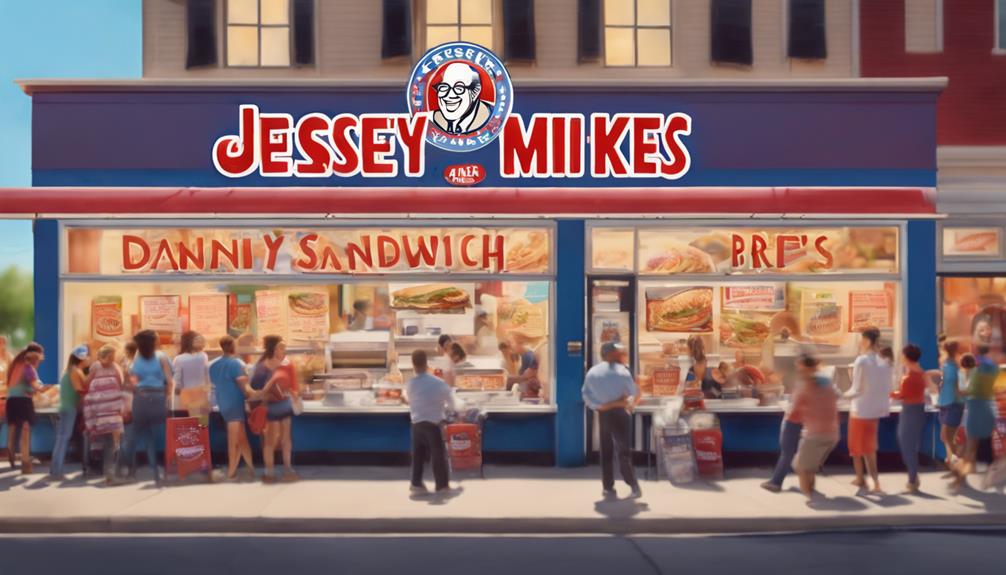Shipley Do-Nuts, founded in 1936, stands out as the #1 donut franchise in 2024, offering a sweet opportunity for aspiring entrepreneurs. With over 60 delicious flavors and a commitment to quality, it caters to evolving market trends and community engagement. Franchisees benefit from extensive training, ongoing support, and adaptable operation options. The initial investment ranges from $655,000 to $1,339,500, with a franchise fee of $40,000 and a 5% royalty on gross sales. This blend of heritage, product diversity, and strong market presence positions Shipley Do-Nuts as a promising investment venture. There's much more to explore about this franchise journey.
Key Elements

In exploring the key elements of the Shipley Do-Nuts franchise opportunity, potential franchisees should focus on the company and business overview.
This includes understanding the brand's history, operational framework, and what they can expect as franchise owners.
With clear information tailored for franchisees, they can make informed decisions about their investment.
Company Overview
Shipley Do-Nuts, founded in 1936 in Houston, Texas, has built a reputation for offering fresh, made-to-order donuts and a diverse menu that includes over 60 flavors.
The brand emphasizes quality and consistency, ensuring each donut is crafted with care. Signature items like the Shipley Glazed and Chocolate Iced donuts have garnered a loyal customer base, further solidifying the company's standing in the competitive food franchise market.
Shipley Do-Nuts actively engages with its community through local marketing initiatives and charitable events, showcasing its commitment to social responsibility.
The franchise also adapts to market trends, offering healthier options while maintaining its classic favorites, ultimately creating a strong connection with customers and enhancing brand loyalty.
Business Overview
The franchise opportunity at Shipley Do-Nuts combines a rich heritage of quality with a diverse menu, appealing to a broad customer base and ensuring strong market presence.
Founded in 1936, Shipley Do-Nuts specializes in fresh, made-to-order donuts, offering over 60 flavors alongside coffee and kolaches. The brand's commitment to excellence has earned it recognition as the #1 donut franchise in 2024.
With effective marketing strategies, including social media promotions and local initiatives, Shipley engages customers while fostering community ties.
The franchise model offers operational flexibility, allowing for absentee ownership and part-time management.
Information for Franchisees
Franchisees can expect a thorough support system that encompasses training, operational flexibility, and ongoing assistance to guarantee their success in the business.
Shipley Do-Nuts provides extensive initial training programs, ensuring franchisees are well-equipped to operate their locations. They also offer ongoing support for business operations, making it easier to navigate challenges.
Franchisees can benefit from absentee ownership or part-time operation, allowing for a flexible approach to management.
With a minimum net worth requirement of $750,000 and liquid capital of $225,000, financial criteria are clearly defined. In addition, in-house and third-party financing options help ease startup burdens.
Company Overview

Founded in 1936, Shipley Do-Nuts has built a strong reputation for its commitment to quality donuts.
The executive team brings extensive experience to the brand, helping it achieve a notable Franchise 500 ranking of #110.
This combination of history and leadership positions Shipley Do-Nuts as a competitive player in the franchise landscape.
Franchise Inception in 1936
Established in 1936 in Houston, Texas, Shipley Do-Nuts has built a reputation for delivering fresh, made-to-order donuts that delight customers across generations. The franchise began with a simple mission: to provide high-quality, delicious donuts to the community.
Over the years, Shipley Do-Nuts expanded its menu, introducing over 60 flavors, including signature items like the Shipley Glazed and Chocolate Iced donuts. This commitment to variety sets it apart in the competitive landscape.
With a focus on customer satisfaction and community involvement, the brand has become a staple for donut lovers. Today, Shipley Do-Nuts proudly continues its legacy, maintaining its core values while adapting to market trends and consumer preferences.
Commitment to Quality Donuts
Shipley Do-Nuts is dedicated to crafting high-quality donuts, ensuring each treat is made fresh and to order for customers. The company adheres to strict quality standards, using premium ingredients to create over 60 delicious flavors.
Signature items like the Shipley Glazed and Chocolate Iced donuts highlight their commitment to flavor and freshness. Each donut is handcrafted, reflecting a tradition that dates back to their founding in 1936.
Shipley Do-Nuts also emphasizes customer satisfaction by continually refining recipes and introducing seasonal flavors. By focusing on quality and consistency, they've established themselves as a trusted name in the donut industry, making every visit a delightful experience for customers and a rewarding opportunity for franchisees.
Executive Team Experience
Leading the way in the donut franchise industry, the executive team at Shipley Do-Nuts brings a wealth of experience and expertise to drive the brand's continued success.
With backgrounds in food service, operations, and franchise development, the leadership team understands the nuances of running a thriving franchise network. Their collective experience guarantees strategic decision-making and effective support for franchisees.
By fostering a culture of collaboration and innovation, they empower franchise owners to excel. The executive team is committed to maintaining high standards of product quality and customer service, which solidifies Shipley Do-Nuts' position in the marketplace.
Their dedication to growth and community engagement reflects a vision that aligns with franchisee goals and consumer expectations.
Franchise 500 Ranking #110
Consistently recognized for its excellence, the franchise ranks #110 in the Franchise 500 for 2024, further solidifying its reputation in the competitive donut industry.
Shipley Do-Nuts has consistently demonstrated strong performance, being named #1 in Doughnuts for both 2024 and 2022. This recognition reflects the brand's commitment to quality and customer satisfaction, contributing to its growing popularity.
Additionally, Shipley ranks #136 in Top Brands for Multi-Unit Owners, highlighting its appeal to entrepreneurs looking to invest in multiple locations.
With over 60 flavors and a rich history since 1936, Shipley not only excels in product offerings but also stands out as a leader in the food franchise sector, making it an attractive opportunity for potential franchisees.
Brand Identity
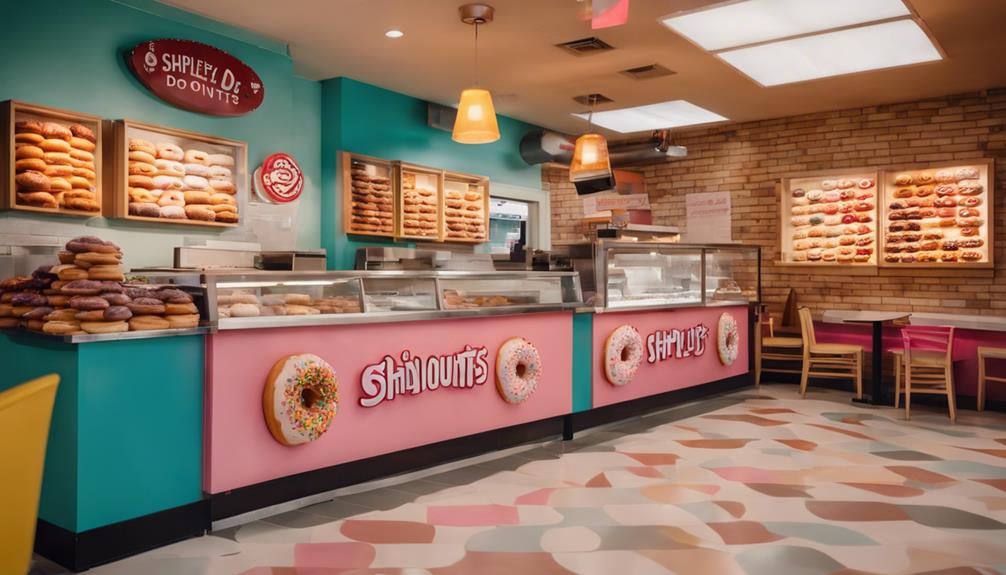
Shipley Do-Nuts has established itself as a leader in the doughnut industry, earning numerous accolades for its delicious offerings.
The brand's commitment to community engagement sets it apart, fostering strong local connections.
With a menu featuring award-winning flavors, Shipley consistently delights customers and reinforces its identity as a top-tier franchise.
Doughnut Industry Leader Accolades
Recognized as a top contender in the doughnut industry, Shipley Do-Nuts has earned prestigious accolades that highlight its exceptional quality and brand strength.
In 2024, the franchise ranked #110 in the Franchise 500 and secured the #1 position in the doughnut category, showcasing its dominance.
Additionally, it ranked #136 among Top Brands for Multi-Unit Owners, reflecting its appeal to franchisees seeking growth opportunities.
Shipley Do-Nuts' consistent high rankings underscore its competitive positioning and commitment to excellence.
Recognized as one of the best food franchises, the brand's accolades reinforce its reputation for quality products and customer satisfaction, making it an attractive choice for potential franchisees looking to invest in a proven market leader.
Commitment to Community Engagement
With a strong focus on community engagement, the brand actively participates in local events and charitable initiatives, fostering connections that benefit both the business and its neighborhoods.
Shipley Do-Nuts understands the importance of giving back, frequently collaborating with schools, nonprofits, and community organizations. Their efforts include sponsoring local sports teams, donating to food drives, and hosting fundraising events that support various causes.
This commitment not only enhances their brand identity but also builds customer loyalty and trust. By being deeply rooted in their communities, Shipley Do-Nuts creates a positive impact while promoting their franchise values.
This approach not only boosts the brand's visibility but also strengthens relationships, ensuring its franchisees thrive alongside the neighborhoods they serve.
Award-Winning Doughnut Flavors
The commitment to community engagement is complemented by Shipley Do-Nuts' award-winning doughnut flavors, which play a vital role in defining the brand's identity and attracting loyal customers.
With over 60 unique flavors, including signature items like the Shipley Glazed and Chocolate Iced donuts, the franchise consistently delivers quality and innovation.
The brand's dedication to freshness and made-to-order preparation sets it apart in a competitive market.
Recognized as the #1 doughnut franchise in 2024 and 2022, Shipley Do-Nuts continues to garner accolades for its delectable offerings.
This reputation not only enhances customer loyalty but also solidifies its position as a leading player in the food franchise sector, making it an appealing opportunity for prospective franchisees.
Information for Franchisees
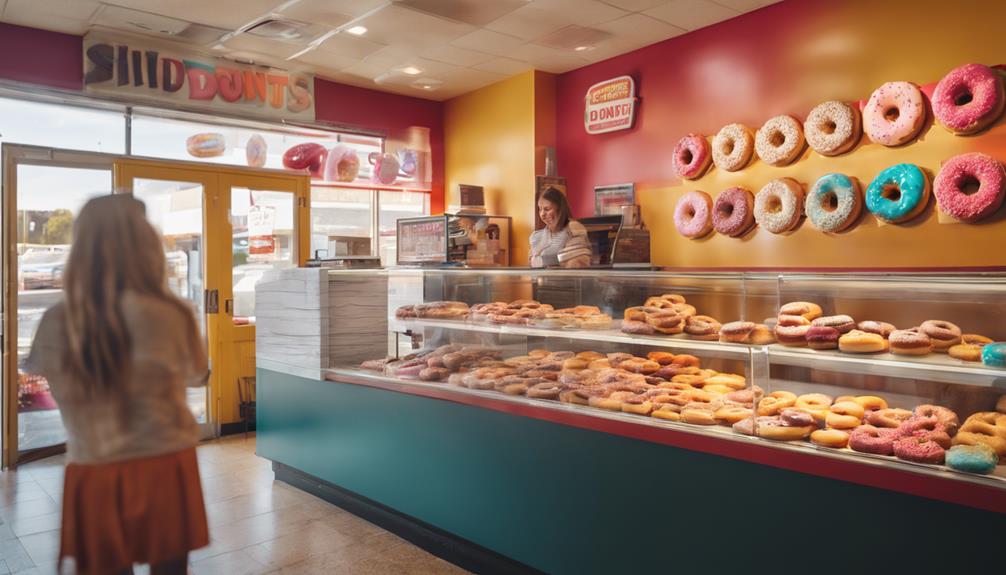
Investing in a Shipley Do-Nuts franchise offers aspiring entrepreneurs a chance to join a well-established brand with a rich history and strong community presence.
Franchisees benefit from thorough initial training programs that equip them with essential skills for success. Continuous support is available, ensuring franchisees can navigate operational challenges confidently.
Shipley Do-Nuts allows for operational flexibility, enabling absentee ownership or part-time management. Additionally, franchisees enjoy exclusive territories, reducing competition within their designated areas.
This strategic approach not only fosters a supportive environment but also encourages franchisees to thrive within the brand. With a proven track record and ongoing assistance, those who invest in Shipley Do-Nuts can confidently start on their entrepreneurial journey.
Financial Requirements & Ongoing Fees
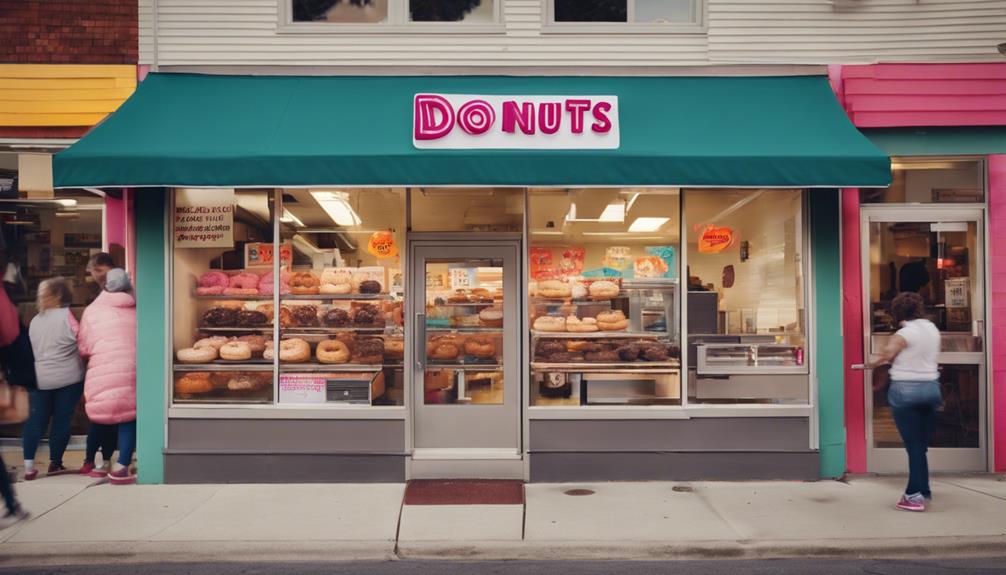
When considering a Shipley Do-Nuts franchise, potential owners need to prepare for significant financial commitments.
The initial investment ranges from $655,000 to $1,339,500, with a one-time franchise fee of $40,000.
Ongoing fees include a royalty set at 5% of gross sales, along with additional marketing contributions and operational costs.
Investment Range: $655,000 – $1,339,500
Franchisees looking to join Shipley Do-Nuts should anticipate an initial investment ranging from $655,000 to $1,339,500, which covers franchise fees and startup costs. This investment includes the one-time franchise fee and various costs associated with launching the business, such as equipment, leasehold improvements, and inventory.
To qualify for this opportunity, prospective franchisees must meet a minimum net worth requirement of $750,000 and possess at least $225,000 in liquid capital. Additionally, franchisees should be prepared for an ongoing royalty fee set at 5% of gross sales.
This financial commitment reflects the brand's strong market presence and the support offered to guarantee franchisee success.
40,000 One-Time Franchise Cost
The one-time franchise cost for Shipley Do-Nuts is set at $40,000, granting franchise rights to new owners.
Alongside this fee, potential franchisees should anticipate an initial investment ranging from $655,000 to $1,339,500. This total includes the franchise fee and various startup expenses necessary to launch the business successfully.
To qualify, applicants must meet a minimum net worth requirement of $750,000, along with a liquid capital requirement of at least $225,000.
These financial prerequisites guarantee that franchisees are adequately prepared for the investment and operational demands of running a Shipley Do-Nuts location.
With proper financial backing, new franchise owners can commence on a rewarding journey in the doughnut industry.
% of Gross Sales
A 5% ongoing royalty fee based on gross sales is required from Shipley Do-Nuts franchisees, ensuring continuous support and brand strength while contributing to the business's operational costs. This fee is detailed in Item 6 of the Franchise Disclosure Document (FDD) and is essential for maintaining the franchise's high standards and competitive edge.
Additionally, potential franchisees must meet specific financial requirements, including a minimum net worth of $750,000 and liquid capital of at least $225,000.
The initial investment ranges from $655,000 to $1,339,500, which includes the one-time franchise fee of $40,000. These financial commitments reflect the value of being part of a recognized brand within the donut industry, poised for ongoing success.
Marketing Contributions
Marketing contributions play an essential role in sustaining brand visibility and driving sales for Shipley Do-Nuts franchisees. These contributions typically include an ongoing royalty fee of 5% of gross sales, which helps fund national marketing initiatives and brand promotions.
Franchisees must also factor in the initial franchise fee of $40,000 and an average total investment ranging from $300,000 to $500,000. Additionally, a minimum net worth of $750,000 and liquid capital of $225,000 are required to qualify.
Operational Supplies and Maintenance
Operational supplies and maintenance costs are essential for franchisees to manage effectively, ensuring the smooth running of Shipley Do-Nuts locations. Franchisees must account for ongoing expenses, including equipment maintenance, inventory replenishment, and utilities.
The franchise requires an ongoing royalty fee of 5% of gross sales, which contributes to continued support and marketing efforts from the franchisor. Additionally, franchisees should anticipate average total investments between $300,000 and $500,000, covering operational supplies and initial setup costs.
Having a minimum of $225,000 in liquid capital and a net worth of at least $750,000 is vital for financial stability. By carefully managing these financial requirements, franchisees can better position their locations for success.
Financing Options
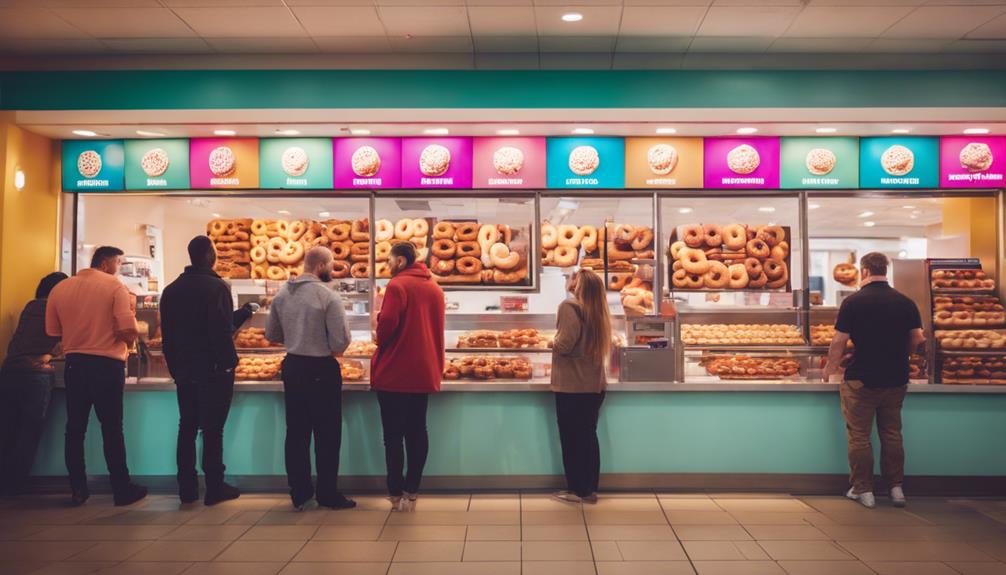
When considering a Shipley Do-Nuts franchise, potential owners should explore various financing options available to them.
Direct franchisee funding can simplify the initial investment process.
Partnerships with external lenders and government-backed loan providers offer additional support.
These resources aim to help franchisees manage startup costs and achieve their business goals.
Direct Franchisee Funding Options
Franchisees can explore various direct financing options to help cover their startup costs and ease the financial burden of launching a Shipley Do-Nuts location.
Shipley Do-Nuts offers in-house financing, which can assist franchisees in managing expenses associated with their new business. This financing option often includes critical costs such as equipment purchases and payroll.
To qualify for these funding solutions, franchisees need to meet specific criteria, ensuring they've the necessary financial stability. Additionally, having a minimum liquid capital of $225,000 and a net worth of at least $750,000 positions them favorably when seeking financial assistance.
These direct funding avenues greatly enhance the feasibility of entering the vibrant Shipley Do-Nuts franchise network.
External Lender Partnerships Available
In addition to in-house financing, Shipley Do-Nuts also collaborates with external lenders to provide franchisees with additional funding options for their startup costs.
These partnerships facilitate access to financial resources that cover various expenses, including equipment and payroll. By working with reputable third-party lenders, Shipley guarantees franchisees can secure the necessary capital to launch their businesses successfully.
Franchisees must meet specific qualification criteria to access these financing options, which helps create a supportive environment for new owners.
The collaboration with external lenders aims to ease the financial burdens associated with starting a franchise, ultimately allowing franchisees to focus on building their Shipley Do-Nuts locations and serving their communities delicious, fresh donuts.
Government-Backed Loan Providers
While exploring financing options, potential franchisees can consider government-backed loan providers that offer favorable terms and support for startup costs.
These loans typically feature lower interest rates and extended repayment periods, making them an attractive choice for new business owners. Programs such as the Small Business Administration (SBA) loans can help franchisees secure the necessary capital to cover initial investments, including equipment and payroll expenses.
Franchisees must meet specific eligibility criteria, which often include demonstrating a solid business plan and financial projections. By leveraging these government-backed loans, prospective Shipley Do-Nuts franchisees can alleviate some financial pressure and focus on building a successful business.
Training & Support Offered
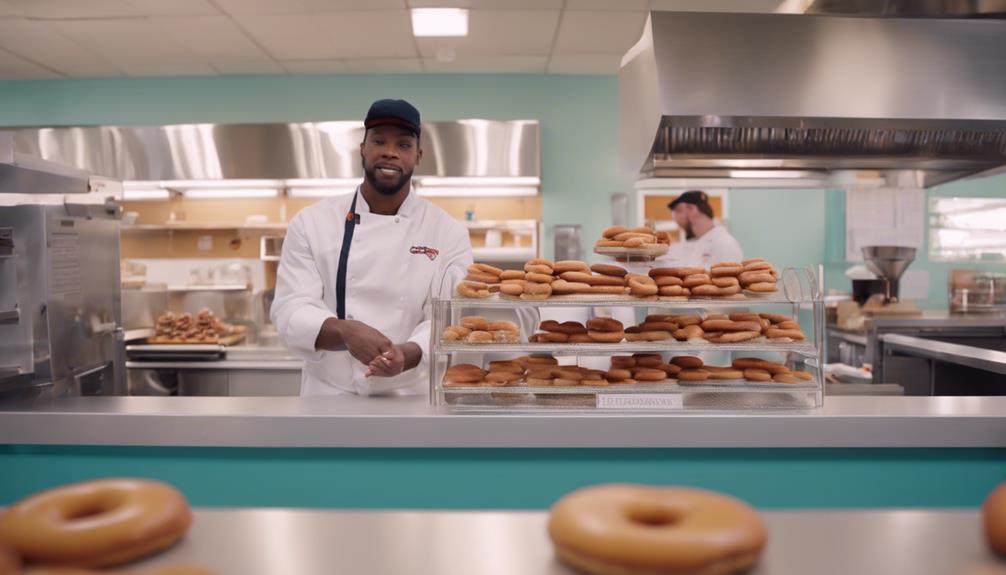
Shipley Do-Nuts provides robust training and support for its franchisees, ensuring they start on the right foot.
Their orientation sessions cover essential operational aspects, while ongoing skill enhancement programs help keep franchisees competitive.
Additionally, they offer assistance with promotional materials to aid in effective marketing efforts.
Franchisee Orientation Sessions
Franchisee orientation sessions provide extensive training and ongoing support to guarantee that new owners effectively navigate their business operations from day one.
These sessions cover essential topics such as product preparation, customer service, and inventory management, ensuring that franchisees are well-equipped to run their shops. Participants also receive hands-on training, allowing them to practice skills in a real-world setting.
Additionally, franchisees gain access to extensive operational manuals that serve as valuable reference tools. The support doesn't stop after orientation; franchisees can rely on a dedicated support team for assistance with ongoing challenges and questions.
This commitment to training and support helps foster confidence and success in new owners, setting them up for long-term growth in the Shipley Do-Nuts family.
Continuous Skill Enhancement Programs
Continuous skill enhancement programs guarantee that franchisees stay updated on industry trends and operational best practices, fostering ongoing growth and success.
Shipley Do-Nuts provides extensive training that covers everything from customer service to product quality. Franchisees benefit from regular workshops and seminars, ensuring they're well-equipped to navigate the evolving market landscape.
Additionally, ongoing support includes access to a dedicated team of experts who offer guidance tailored to each franchise's unique needs. This commitment to continuous learning not only boosts franchisee confidence but also enhances overall operational efficiency.
With a focus on collaboration and shared knowledge, Shipley Do-Nuts empowers franchisees to thrive, adapt, and maximize their business potential in a competitive industry.
Promotional Material Assistance
Recognizing the importance of effective marketing, the franchise provides extensive support in creating promotional materials that help franchise owners attract and retain customers.
Shipley Do-Nuts offers a range of resources, including customizable templates for flyers, social media graphics, and in-store signage. This guarantees that franchisees can effectively communicate their brand's message and special promotions.
Additionally, franchise owners receive guidance on local marketing strategies tailored to their specific communities. The franchise also organizes seasonal campaigns and loyalty programs, enhancing customer engagement.
With ongoing support from the corporate team, franchisees can adapt their marketing efforts based on performance analytics. This thorough promotional material assistance empowers franchisees to drive sales and cultivate lasting customer relationships.
LEGAL AND REGULATORY

When considering a Shipley Do-Nuts franchise, understanding the legal and regulatory framework is vital.
Franchisees need to be aware of the ongoing royalty fee, which is set at 5% of gross sales, as outlined in Item 6 of the Franchise Disclosure Document (FDD).
This fee is an integral aspect of the franchise agreement that impacts overall profitability.
Item 6: Royalty Fee Details
In Item 6 of the Franchise Disclosure Document, potential franchisees will find vital details about the royalty fee structure that governs their business operations.
This section outlines the key legal obligations involved, ensuring franchisees understand their financial commitments to the Shipley Do-Nuts brand.
Reviewing these points is essential for making informed decisions about the franchise opportunity.
Key Sections to Review
The royalty fee structure for Shipley Do-Nuts franchises mandates a 5% payment of gross sales, ensuring ongoing support and brand strength.
This fee is vital for maintaining the franchise's competitive edge and operational assistance.
Franchisees benefit from continuous marketing and training resources, enhancing their business effectiveness.
Understanding these financial obligations is important for prospective franchise owners considering joining the Shipley Do-Nuts family.
Legal Obligations
Franchisees must adhere to a 5% royalty fee on gross sales, which plays an essential role in sustaining the brand's support and resources.
This ongoing fee guarantees that franchisees receive marketing assistance, training, and operational support.
MARKET ANALYSIS

The market for gourmet donuts has seen a significant rise, particularly among millennial consumers who seek unique flavors and quality ingredients.
Shipley Do-Nuts positions itself well within this trend by offering an extensive menu that caters to these preferences.
This growing demand presents a promising opportunity for franchisees looking to tap into a thriving segment of the dessert industry.
Consumer Preferences for Gourmet Donuts
Consumer preferences for gourmet donuts have seen a significant surge in recent years, reflecting a growing appetite for unique flavors and high-quality ingredients.
This trend contributes to the overall growth of the gourmet donut market, attracting both new customers and seasoned enthusiasts.
As demand continues to rise, franchise opportunities like Shipley Do-Nuts stand to benefit from this evolving consumer landscape.
Gourmet Donut Popularity Surge
Why has the popularity of gourmet donuts surged in recent years, enchanting taste buds and driving innovation in the dessert market?
Consumers crave unique flavors and high-quality ingredients, leading to a rise in artisanal creations.
Social media also amplifies exposure, encouraging experimentation and sharing.
This demand for gourmet options reflects a broader trend toward indulgent, personalized treats, reshaping dessert preferences across demographics.
Gourmet Donut Market Growth
Gourmet donuts are capturing attention as consumers increasingly seek out unique flavors and high-quality ingredients, driving significant growth in the market.
This trend reflects a shift toward indulgence and personalization, with customers favoring artisanal creations over traditional options.
As a result, businesses that innovate and offer diverse, premium selections are thriving, making gourmet donuts a lucrative segment within the broader dessert industry.
Millennial Gourmet Donut Consumers
Millennial consumers are reshaping the gourmet donut market with their distinctive preferences and buying behaviors.
They often seek unique flavors and experiences, driving trends that emphasize artisanal quality and social media appeal.
Understanding these insights is essential for franchisees looking to cater to this influential demographic.
Millennial Doughnut Consumer Insights
The rising trend among younger consumers shows a growing appetite for unique and innovative donut flavors, driving the demand for gourmet options in the market.
Millennials seek experiences that reflect their values, favoring artisanal ingredients and creative combinations.
This demographic prioritizes quality over quantity, leading to a shift towards premium offerings that enhance their indulgent treats and align with their adventurous palates.
Millennial Doughnut Buying Trends
Younger consumers are increasingly drawn to unique donut offerings that emphasize quality and creativity, shaping their buying habits in the gourmet market.
They prefer artisanal flavors, locally sourced ingredients, and aesthetically pleasing presentations that invite social sharing.
This trend encourages brands like Shipley Do-Nuts to innovate and diversify their menu, aligning with millennial values of sustainability and experience over mere consumption.
EXIT STRATEGY

When considering an exit strategy for a Shipley Do-Nuts franchise, franchisees should understand the guidelines for transferring ownership.
Effective changeover strategies can facilitate a smooth handover, ensuring the business remains successful under new management.
Franchise Transfer Guidelines
Franchisees considering an exit strategy must adhere to Shipley Do-Nuts' transfer guidelines to guarantee a smooth handover of ownership.
These guidelines require franchisees to notify the franchisor of their intent to transfer and obtain approval before proceeding.
Shipley Do-Nuts assesses potential buyers to verify they meet the brand's financial and operational standards.
Additionally, franchisees must provide all necessary documentation and disclosures during the transfer process.
Training and support for the new owner are also essential components, ensuring they're equipped to maintain the franchise's high standards.
Ultimately, following these guidelines helps preserve the brand's integrity and fosters a seamless transition, benefiting both the outgoing and incoming franchisees.
Franchise Ownership Transition Strategies
Steering the shift of franchise ownership requires careful planning and strategic execution to guarantee a smooth and successful exit.
Franchisees should begin by evaluating their business's financial health and market position, ensuring potential buyers see value. Developing a robust exit plan that includes timelines and realistic valuations is vital.
They must also engage with the franchisor early in the process to understand transfer protocols and requirements. Marketing the franchise effectively to interested buyers is essential, utilizing online platforms and industry networks.
Additionally, providing thorough training and support during the changeover can facilitate a seamless handover. Finally, staying transparent with employees and customers helps maintain trust and stability throughout the ownership change.
ADDITIONAL RESOURCES

In exploring additional resources, franchisees can benefit from a variety of support options offered by Shipley Do-Nuts.
These include a dedicated franchisee support hotline, which provides immediate assistance, and networking opportunities that foster community among franchise owners.
Together, these resources enhance the overall franchise experience and contribute to business success.
Franchisee Support Resources
Extensive support resources are available to confirm franchise owners thrive in their business operations. Shipley Do-Nuts provides a robust training program that equips franchisees with essential skills and knowledge from day one.
Ongoing operational support guarantees that franchisees can tackle challenges effectively, promoting sustained success. Franchisees also benefit from exclusive territories, allowing them to operate without competitive pressures. This structure not only fosters a sense of community among franchise owners but also enhances brand loyalty.
Additionally, financial assistance options, including in-house financing and partnerships with third-party lenders, help franchisees manage their startup costs. By prioritizing these resources, Shipley Do-Nuts empowers franchise owners to build profitable businesses while enjoying the benefits of a well-established brand.
Franchisee Support Hotline
How can franchisees quickly resolve their concerns?
The Shipley Do-Nuts Franchisee Support Hotline provides immediate assistance, ensuring that owners have access to the help they need when challenges arise. This essential resource offers a direct line to experienced support staff who are knowledgeable about operations, marketing, and management issues specific to the franchise.
Franchisees can call the hotline to address questions or concerns regarding daily operations, equipment maintenance, or customer service strategies. The responsive nature of this support enhances franchisee confidence, allowing them to focus on growing their business.
With the Franchisee Support Hotline, Shipley Do-Nuts demonstrates its commitment to empowering franchise owners, ensuring they feel supported every step of the way.
Franchisee Networking Opportunities
Alongside the Franchisee Support Hotline, Shipley Do-Nuts offers valuable networking opportunities to franchise owners, fostering connections that enhance collaboration and sharing of best practices.
Franchisees can participate in regional meetings and annual conventions, where they can exchange ideas and strategies. These events encourage relationship-building, enabling owners to learn from each other's successes and challenges.
Additionally, franchisees gain access to a dedicated online platform that facilitates ongoing discussions and resource sharing. This strong network not only supports business growth but also cultivates a sense of community among franchise owners.
What Makes Shipley Do-Nuts a Better Franchise Opportunity Than Dairy Queen?
When comparing the dairy queen franchise opportunity to Shipley Do-Nuts, there are a few key factors that make Shipley a better choice. Shipley Do-Nuts has a strong brand presence in the market, offers a diverse product line, and provides comprehensive training and support for franchisees, making it a more promising investment.
Conclusion
To sum up, Shipley Do-Nuts offers a compelling franchise opportunity for aspiring entrepreneurs.
With its rich history, diverse menu, and strong community ties, the brand stands out in the competitive food service industry.
Franchisees benefit from extensive training, ongoing support, and a proven business model, making it easier to succeed.
As the demand for fresh, quality donuts continues to grow, investing in Shipley Do-Nuts could be a sweet and rewarding decision for those looking to enter this thriving market.





